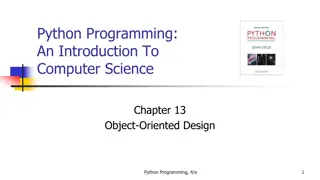Object-Oriented Design by Contract with Declarative Bounded Testing
Comprehensive overview of Object-Oriented Design by Contract (DbC) with Declarative Bounded Testing, exploring its background, principles, implementation in programming languages, and application through bounded exhaustive testing. Learn how DbC enhances software reliability and development practices.
Download Presentation

Please find below an Image/Link to download the presentation.
The content on the website is provided AS IS for your information and personal use only. It may not be sold, licensed, or shared on other websites without obtaining consent from the author.If you encounter any issues during the download, it is possible that the publisher has removed the file from their server.
You are allowed to download the files provided on this website for personal or commercial use, subject to the condition that they are used lawfully. All files are the property of their respective owners.
The content on the website is provided AS IS for your information and personal use only. It may not be sold, licensed, or shared on other websites without obtaining consent from the author.
E N D
Presentation Transcript
dbcbet: Object-Oriented Design by Contract with Declarative Bounded Exhaustive Testing Christopher Coakley and Peter Cappello
Overview Background Design by Contract Bounded Exhaustive Testing (Korat) dbcbet Object Oriented Design by Contract Declarative Bounded Exhaustive Testing
Design by Contract Est. 1986, Bertrand Meyer, Eiffel Precondition Violation = bug in caller Postcondition Violation = bug in callee Invariant Violation = bug in callee Liskov Substitution Principle Preconditions may be weakened by subclasses Postconditions and Invariants may be strengthened by subclasses
Design by Contract Contracts have native support Spec#, Clojure, Racket, Eiffel Contracts can be added via libraries/tools C++, Java, Python, Ruby Eiffel made guarantees about exception types, but this is not typically viewed as part of a contract Contracts are orthogonal to the type system
Bounded Exhaustive Testing Test a model of the software TestEra Alloy Test the code Korat Finitization
Python Decorators for Syntax # Python decorator @foo def bar(): pass # Is equivalent to def bar(): pass bar = foo(bar) # foo can redefine bar
Syntax Example @inv(invariant) class BusMonitor(object): @pre(precondition1) @pre(precondition2) @post(postcondition) @throws(IOError, CustomException) @finitize_method([device(1),device(2)],range(-1,10)) def attach(self, device, priority):
How it works First applied component (@pre, @post, @throws, @inv) wraps the method with a contract invoker Each component creates or appends to a list of preconditions, postconditions, invariants, or throws Inheritance is managed by @inv or @dbc Postcondition parameter: old
Invoker def create_invoker(method): """invoker checks all contract components and invokes the method.""" @wraps(method) def invoker(s, *args, **kwargs): check_preconditions(wrapped_method, s, *args, **kwargs) o = old(method, s, args, kwargs) try: ret = method(s, *args, **kwargs) check_postconditions(wrapped_method, s, o, ret, *args, **kwargs) check_invariants(wrapped_method, s, *args, **kwargs) except Exception as ex: if check_throws(wrapped_method, ex, s, *args, **kwargs): raise return ret return invoker
Contract Components are Objects Predicates can provide custom error messages Allows for stateful guards Ex. precondition: can t call me more than once State belongs to contract, not guarded object Composable and Resusable dbcbet.helpers contains reusable primitives
Finitization A python dict for classes { fieldname: [assignments] } A sequence of sequences for methods Positional arguments Syntax: @finitize({'re':xrange(-1,1),'img':[None,- 1,0,1]}) @finitize_method(enumerate(Person))
Ported JML Example Complex ComplexOps Rectangular Polar
Some Contract Definitions def real_part_post(self, old, ret): return approx_equal(self._magnitude() * math.cos(self._angle()), ret, tolerance) def angle_post(self, old, ret): return approx_equal(math.atan2(self._imaginary_part(), self._real_part()), ret, tolerance) def arg_not_none(self, b): """This is a custom error message""" return b is not None
Example @dbc class Complex(object): @post(real_part_post) def real_part(self): pass @post(imaginary_part_post) def imaginary_part(self): pass @post(magnitude_post) def magnitude(self): pass @post(angle_post) def angle(self): pass
@dbc class ComplexOps(Complex): @pre(argument_types(Complex)) @post(add_post) @finitize_method(complex_gen) def add(self, b): return Rectangular(self.real_part() + b.real_part(), self.imaginary_part() + b.imaginary_part()) @post(mul_post) @finitize_method(complex_gen()) def mul(self, b): try: return Polar(self.magnitude() * b.magnitude(), self.angle() + b.angle()) except ValueError: return Rectangular(float('nan'))
@inv(polar_invariant) @finitize(finitize_polar) class Polar(ComplexOps): @pre(argument_types(Number, Number)) @finitize_method([-1,0,1], [-math.pi,0,math.pi/4.0,math.pi/2.0]) @throws(ValueError) def __init__(self, mag, angle): if math.isnan(mag): raise ValueError() if mag < 0: mag = -mag; angle += math.pi; self.mag = mag; self.ang = standardize_angle(angle) def _real_part(self): return self.mag * math.cos(self.ang) # specification inherited real_part = _real_part
Helper Examples def immutable(self, old, ret, *args, **kwargs): """Object immutability was violated by the method call (did you forget to override __eq__?)""" return old.self == self # use: @post(immutable)
class argument_types(object): """DBC helper for reusable, simple predicates for argument-type tests used in preconditions""" def __init__(self, *typelist): self.typelist = typelist self.msg = "implementation error in argument_types" def __call__(self, s, *args, **kwargs): for typ, arg in zip(self.typelist, args): if not isinstance(arg, typ) and arg is not None: self.msg = "argument %s was not of type %s" % (arg, typ.__name__) return False return True def error(self): return self.msg # use: @pre(argument_types(Number, Number))
Testing >>> from dbcbet import bet >>> for typ in [Polar, Rectangular]: ... bet(typ).run() Summary: Instance Candidates: 12 Invariant Violations: 0 Method Call Candidates: 180 Precondition Violations: 0 Failures: 0 Successes: 180 42 instances 750 tests real 0m0.286s user 0m0.255s sys 0m0.021s 258 instances 4854 tests real 0m1.376s user 0m1.338s sys 0m0.022s Summary: Instance Candidates: 30 Invariant Violations: 0 Method Call Candidates: 570 Precondition Violations: 0 Failures: 0 Successes: 570
How bet.run works Construct an Object Class or constructor finitization For each method, construct an argument list If the precondition fails, skip Execute method Test succeeds if postcondition and invariant hold Do this for all object * method * argument combinations
Future Work Rewrite BET code to use object pooling Makes testing self-referential structures significantly easier Eliminate helpers like enumerate(Person) Add metaclass option for contract inheritance
References Meyer, Bertrand: Design by Contract, Technical Report TR-EI-12/CO, Interactive Software Engineering Inc., 1986 pyContract: http://www.wayforward.net/pycontract/ pyDBC: http://www.nongnu.org/pydbc/ Gary T. Leavens, Yoonsik Cheon. Design by Contract with JML., 2006 Aleksandar Milicevic, Sasa Misailovic, Darko Marinov, and Sarfraz Khurshid. 2007. Korat: A Tool for Generating Structurally Complex Test Inputs. In Proceedings of the 29th international conference on Software Engineering (ICSE '07).
Thank You Code available at: https://github.com/ccoakley/dbcbet
Existing Contract Libraries Python pyContract pyDBC
pyContract Contracts are part of documentation strings PEP 316
def sort(a): """Sort a list *IN PLACE*. pre: # must be a list isinstance(a, list) # all elements must be comparable with all other items forall(range(len(a)), lambda i: forall(range(len(a)), lambda j: (a[i] < a[j]) ^ (a[i] >= a[j]))) post[a]: # length of array is unchanged len(a) == len(__old__.a) # all elements given are still in the array forall(__old__.a, lambda e: __old__.a.count(e) == a.count(e)) # the array is sorted forall([a[i] >= a[i-1] for i in range(1, len(a))]) """
pyDBC Metaclass based Metaclasses are inherited properly pyDBC inheritance works properly (it was fixed) Separate methods for contracts non-reusable due to naming requirements
import dbc __metaclass__ = dbc.DBC class Foo: def __invar(self): assert isinstance(self.a, int) def __init__(self, a): self.a = a def foo(self, a): self.a *= a def foo__pre(self, a): assert a > 0 def foo__post(self, rval): assert rval is None






















